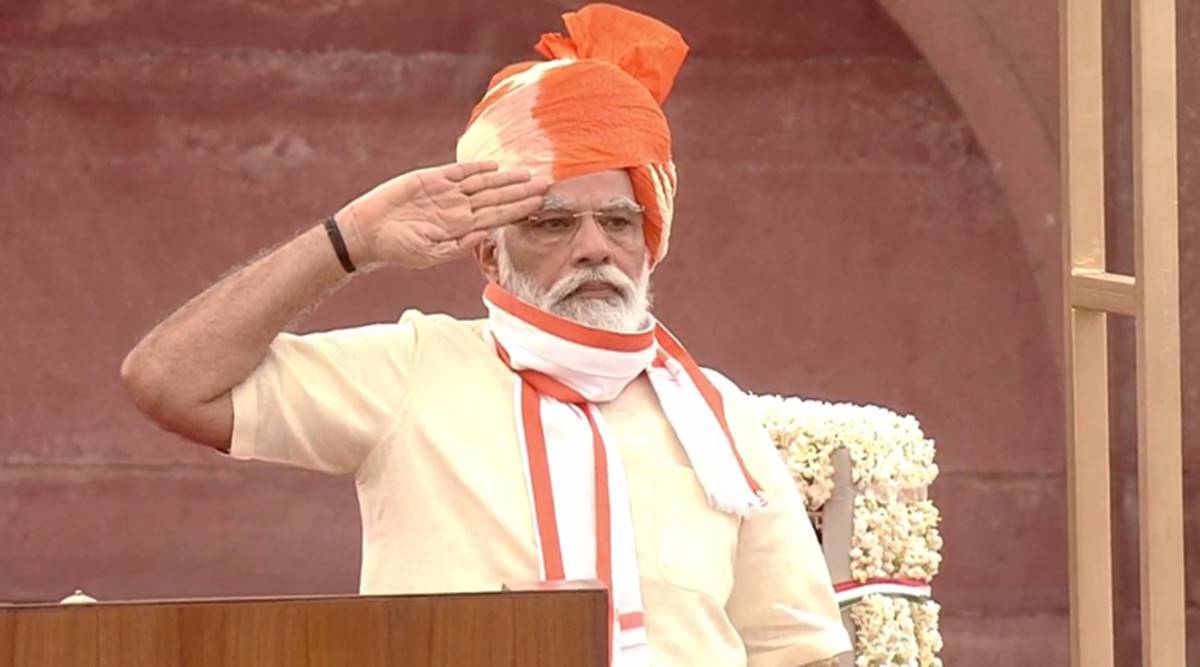 On Saturday, during his Independence Day address, the Prime Minister said: “Be it terrorism or expansionism, India is fighting against it valiantly.” (Source: Twitter/@BJP4India)
On Saturday, during his Independence Day address, the Prime Minister said: “Be it terrorism or expansionism, India is fighting against it valiantly.” (Source: Twitter/@BJP4India)For the first time since the border faceoff with China, Prime Minister Narendra Modi spoke about “terrorism” and “expansionism” in the same sentence, and said that India is fighting both “valiantly” — from the LoC to the LAC.
Modi has often referred to terrorism and Pakistan in the same context previously, and recently spoke about expansionism during a visit to Ladakh in early July following the border clash with Chinese troops on June 15.
On Saturday, during his Independence Day address, the Prime Minister said: “Be it terrorism or expansionism, India is fighting against it valiantly.” He also said that elections will be held in Jammu and Kashmir after the delimitation exercise is over in the year-old Union Territory.
Referring to the LAC stand-off in eastern Ladakh, Modi said: “Notwithstanding the recent adversities, there have been misadventures along the border which threw a challenge to the country. But whoever tried to threaten the sovereignty of our country, right from the LoC (with Pakistan) to the LAC (with China), the Army of the country, our brave soldiers, have given a befitting reply.”
The Prime Minister also emphasised the government’s commitment to strengthening the national security apparatus, and spoke about “new roads are being constructed everywhere, from Ladakh to Arunachal Pradesh”. This was a reference to the DSDBO (Darbuk-Shyonk-Daulat Beg Oldie Road), which is one of the key infrastructure projects in eastern Ladakh, close to the LAC.
After pointing to the broad global support for India, Modi underlined that South Asia is home to one-fourth of the world’s population, and called upon leaders of all countries in the region to fulfil their responsibility towards ensuring progress and development.
Speaking about his diplomatic outreach to the extended neighbourhood, the Prime Minister said: “Today, neighbours are not the only ones with whom we share geographical boundaries, but also those with whom we have close and harmonious relations. It is my pleasure that India has strengthened its relationship with all the countries in its extended neighbourhood in the last few years… Similarly, our ASEAN countries in the east, who are our maritime neighbours, also hold special importance.”
Referring to J&K, Modi said: “A delimitation exercise is going on in Jammu and Kashmir. The work of delimitation is being carried out under the leadership of a retired judge of the Supreme Court. As soon as the work is completed speedily, the country is committed to conduct elections there, and J&K will have MLAs, Ministers, a Chief Minister….”
In March, the Law Ministry had notified the Delimitation Commission for J&K, Assam, Arunachal Pradesh, Manipur and Nagaland. The three-member Commission is being headed by former Supreme Court judge Justice Ranjana Prakash Desai.
Delimitation is the process of redrawing boundaries of Lok Sabha and Assembly seats to represent changes in population and done on the basis of the last Census.
Last August 5, while announcing the reorganisation of the state into the Union Territories of J&K and Ladakh, Home Minister Amit Shah had said that delimitation of Assembly constituencies would be carried out on the basis of the 2011 Census.
According to the J&K Reorganisation Act passed by Parliament last year, “…the number of seats in the Legislative Assembly of Union Territory of Jammu and Kashmir shall be increased from 107 to 114, and delimitation of the constituencies may be determined by the Election Commission in the manner hereinafter provided.”
Before the state was split, the Kashmir region had 46 seats, followed by Jammu with 37 and Ladakh with four for a total of 87 seats, while 24 were kept perennially vacant for Pakistan-occupied Kashmir.
The Act also says that the Lok Sabha will have five seats from the Union Territory of J&K and one from Ladakh.
In J&K, BJP leaders have maintained that Jammu, where the party holds considerable sway, has been discriminated against by a Kashmir-heavy polity and that delimitation would ensure appropriate representation for the region.
Even Congress leader Ghulam Nabi Azad had tried to push for delimitation during his tenure as Chief Minister but could not get alliance partner PDP onboard.
Political parties in the Valley have been opposed to such an exercise. In May, the National Conference rejected the move, saying its three MPs from Kashmir, who were appointed as associate members in the Delimitation Commission, would not accept their positions since that would be “tantamount to accepting the events of 5th August 2019”.
There is also opposition from sections in Jammu, including the BJP and Kashmiri Pandits, on the 2011 Census being the basis for delimitation. They claim that the 2011 Census was skewed in favour of Kashmir.
According to the Census, the population of Kashmir region (68.9 lakh) is about 15 lakh more than that of the Jammu region (53.8 lakh). In 2001, this gap was about 10 lakh.